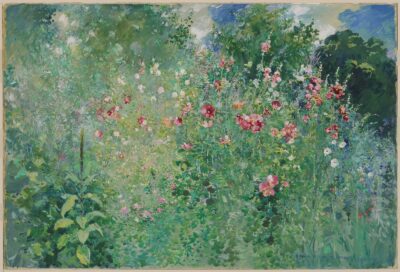
“A Garden Is a Sea of Flowers,” Ross Sterling Turner, 1912 (Museum of Fine Arts Boston)
Hello, historians! We have plenty of great #USIH2021 conference panels blossoming this March, and we hope you’ll join us here at the blog for some exciting roundtables. We know that your Zoom dance cards can fill up quickly, so in our final two months of this year-long conference series, we’ve added in some Tuesday and Sunday offerings—think of it as a spring bouquet of intellectual history! Scroll on through for details, and click on the dates and titles for more info. As always, registration is FREE but it is required.
Intellectual History at the Confluence of Sex and Religion
This panel brings together threads of religious history, sexuality studies, and intellectual history. It seeks to demonstrate that religious thinkers – preachers, ministers, laypeople, theologians, and artists – have made essential contributions to how modern Americans think about sex. Rather than sit on the sidelines of secular sexual modernity, religious thinkers should be considered integral to the making of 20th-century sexual enthusiasm. While intellectual historians have long recognized the importance of Puritans and other “reactionaries” for sexual discourse, we are more likely to ignore how modern sexuality is often infused with religious ideas. Our presenters challenge a binary narrative that places religion in a reactionary conservative mode and seculars in progressive worldly stance. Panelists include Monica Mercado, Katherine Dugan, Suzanna Krivulskaya, Anthony Petro, Samira Mehta, and Peter Cajka.
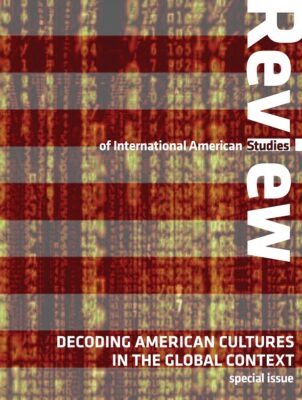 SUNDAY, 7 MARCH 2021, 12PM EST
SUNDAY, 7 MARCH 2021, 12PM EST
U.S. Studies in an International Context
American Studies has long been a topic of considerable importance to students and scholars in every part of the world. The literature interpreting United States society, culture, and global influence includes a growing number of articles and books produced by non-U.S. scholars working in many languages. The panel brings together scholars from the United States, India, Brazil, and Argentina to discuss how the United States is represented and interpreted in other countries. We will explore how transnational debates and what can be learned from viewing the United States from the outside. The contributors in their published work have written about how U.S. influence abroad works, cultural and educational exchange, tourism, the women’s movement and feminism, and contesting understandings of democracy. Panelists include Richard Cándida Smith, Jane C. Desmond, Virginia R. Dominguez, Manpreet Kaur Kang, Ana Maria Mauad, and Ricardo D. Salvatore.
MONDAY, 15 MARCH 2021, 7PM EST
Prison Pedagogy: Teaching History and Ideas with Incarcerated Students
Panelists on this roundtable session will discuss their experiences with prison teaching, including some consideration of how different programs work. We’ll consider, from perspectives inside and outside, what works and what doesn’t in prison classrooms, describing differences and similarities with other, presumably “conventional” teaching experiences. We’ll talk about the concepts, subjects, and texts that we have found to be successful in prison classrooms, and address questions about the larger, liberatory aims of prison pedagogy. Panelists include Molly Reed, Andy Eisen, and Pete Kuryla.
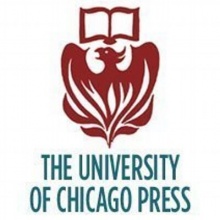 TUESDAY, 16 MARCH 2021, 5PM EST (NOTE TIME CHANGE)
TUESDAY, 16 MARCH 2021, 5PM EST (NOTE TIME CHANGE)
Early America Imagines the Future
How did revolutionaries and reformers of early America imagine the future? How did they challenge political, cultural, and spiritual ideas of personal growth and national progress? New scholarship from the University of Chicago Press helps us to reframe early American intellectual history through a careful reconsideration of what “the future” meant. Panelists include Emma Hart, Emily Pawley, Kenyon, and Evan Haefeli.
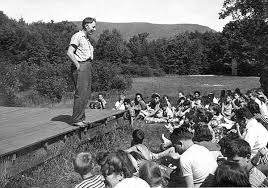 MONDAY, 22 MARCH 2021, 7PM EST
MONDAY, 22 MARCH 2021, 7PM EST
In the 1930s, ‘40s and ‘50s, three pioneering American folklorists–Benjamin Botkin, Tony Schwartz, and Norman Studer–challenged existing definitions of “folk” culture along similar lines, expanding its boundaries to include new subjects and source material. Whereas folk collectors of the late nineteenth and early twentieth century scoured the countryside for lingering traces of pre-modern Anglo-Saxon musical and oral traditions, these three figures regarded the American metropolis–and the disparate voices of immigrants, workers, ex-slaves, women, children, and outsiders–as a fresh and vital source of vernacular culture. By revisiting their underappreciated work and careers, which converged at several points in the 1940s and ‘50s, this panel elaborates a unique, revolutionary vision of the city and of the uses of folklore at midcentury. It will also address the following key themes: the tensions between cultural nationalist and internationalist dimensions of their work; the paradoxes of using technology and mass media for participatory, democratic ends; the place of the city and the country in American cultural identity; and the role of the non-professional in scholarship and cultural production. This panel will show that the capacious and eclectic conception of “folk” shared by Botkin, Schwartz, and Studer reflected a common commitment to the cultural pluralist and the democratic vision of the Popular Front. Panelists include Benjamin Jordan Serby and Rivka Maizlish.
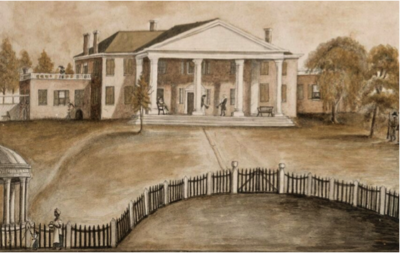 SATURDAY, 27 MARCH 2021, 12PM-3PM
SATURDAY, 27 MARCH 2021, 12PM-3PM
TEACHING INTELLECTUAL HISTORY WORKSHOP
Beyond the Text: Reading Objects and Images
Participants will discuss the use and relevance of material and visual culture to intellectual history, and work together to create a “How to” guide for students to analyze objects and images in the classroom. The workshop will be led by scholars and practitioners of material and visual culture, including historians, art historians, curators, and education directors at museums and historic sites. Panelists include: Whitney Nell Stewart, Jennifer Van Horn, Jennifer Hammond, Michelle Everidge, Aston Gonzalez, Jonathan M. Square, Elizabeth Humphrey, and Elizabeth Chew.
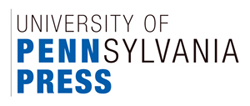 TUESDAY, 30 MARCH 2021, 7PM EST
TUESDAY, 30 MARCH 2021, 7PM EST
Black freedom fighters throughout history have employed a wide and diverse array of freedom strategies. Whether by maneuvering through and taking advantage of thick legal language of the day from multiple imperial governments, violent protest, military service, voting, petitioning, or physically emigrating or imagining the possibility of emigrating to lands outside of the borders of the United States, Black freedom seekers pursued every conceivable channel possible to liberation. Over the past few years, the University of Pennsylvania Press has published incredibly generative scholarship that expands our understanding of Black politics from the 18th to the early 20th century. “The Politics of Black Freedom” panel will feature scholars whose recent works, published by the University of Pennsylvania Press, explain the complicated manueverings of Black political freedom thinkers from their research. Panelists include Adam X. McNeil, Kellie Carter Jackson, Brandon Byrd, and Christopher Bonner.

0